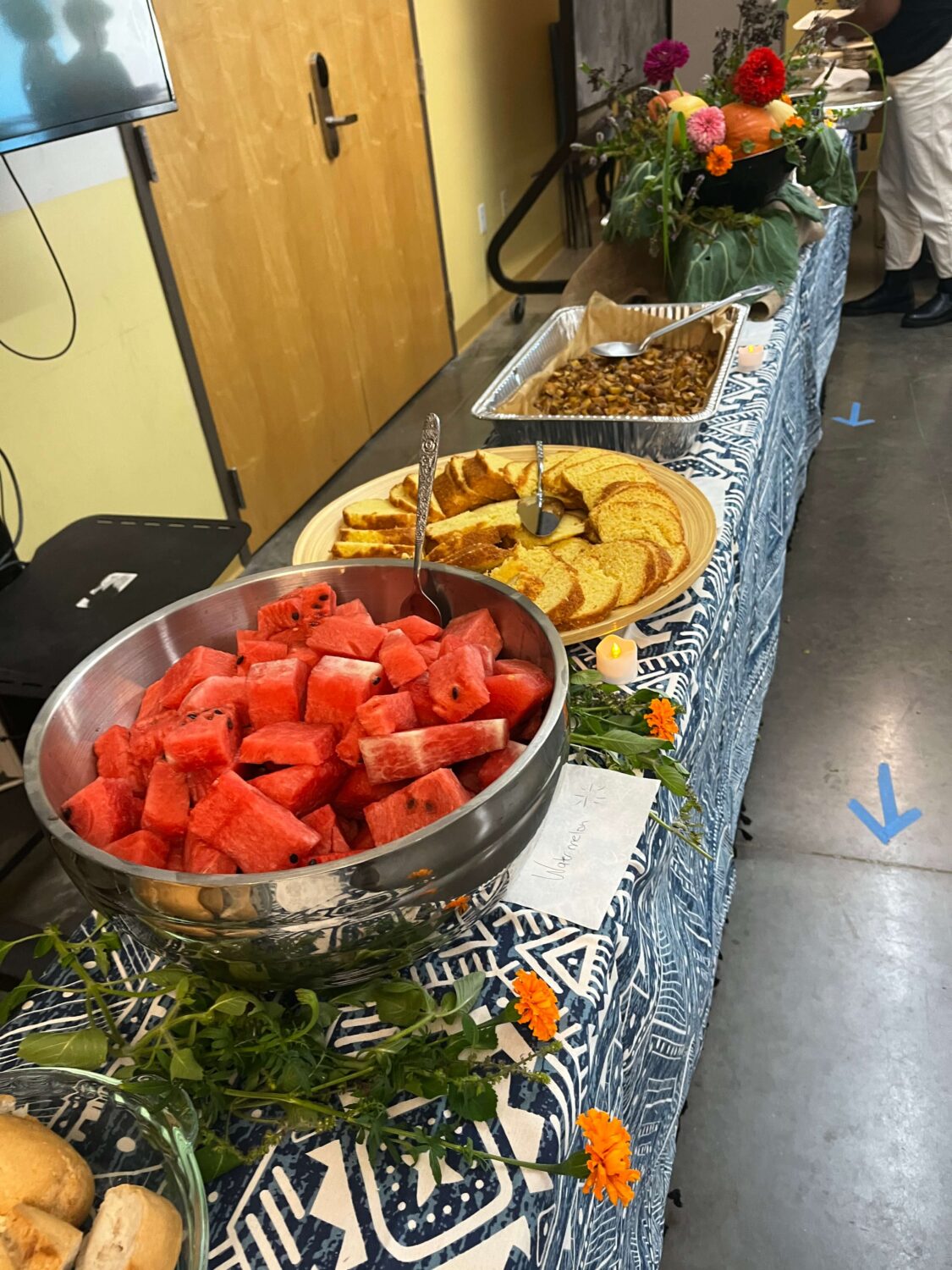
Robert Chappell contributed to this report.
From institutions and organizations, all the way to individual producers and systems workers, the turn towards agriculture in communities of color has been picking up its pace in the last few years locally and around the country. Here in Madison, there is no shortage of people looking to get involved.
One opportunity to get connected into that world of agriculture took place yesterday at the Farm 2 Table: Soulful Sunday Brunch hosted by local growers Alex Booker and Charisse Daniels-Johnson to raise money for a trip to the Black Urban Growers Conference in Philadelphia. The brunch took place at Badger Rock Neighborhood Center on Madison’s south side with about a dozen people in attendance. The buffet included black-eyed peas, cornbread, egg bites, collard greens, savory sweet potatoes, long-grain rice and fresh fruit, with blueberry pastry for dessert. Most of the food was grown by Booker at his farm plot at Firmly Footed Farms near Black Earth, with some also donated by Loveland Acres, a Black-owned farm near Elkhorn.
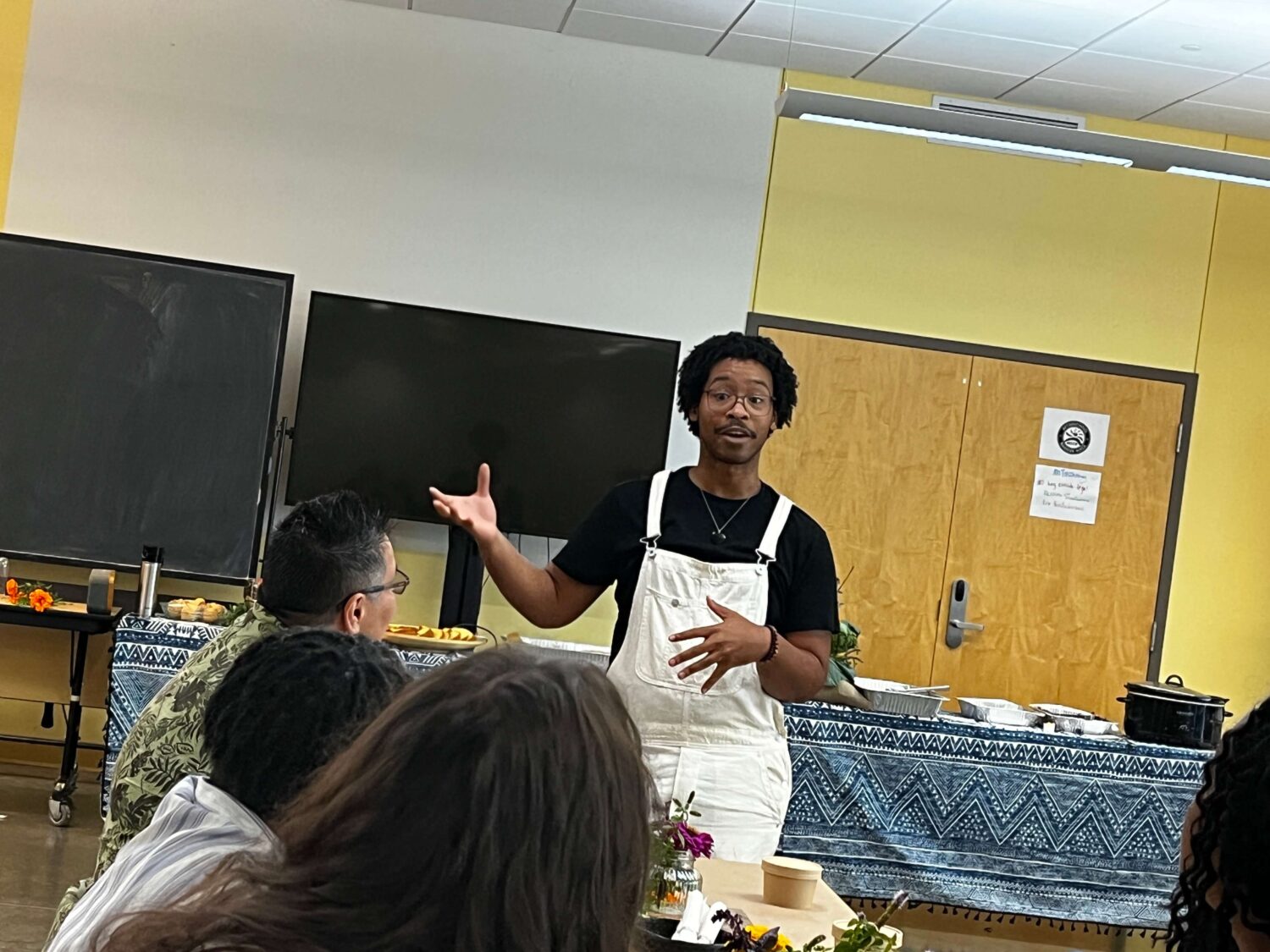
Booker and Daniels-Johnson, along with fellow local farmer Sebastian Hassell, are looking to fundraise enough to go out to the conference and came upon the idea of hosting a brunch when they realized the personal cost of attending without any institutional or organizational support.
Booker attended last year’s conference in Atlanta, and noticed he was the only person there from Wisconsin.
“I’m a very community-based person, and I’m someone who tries to circulate my dollar within the Black community in Madison,” Booker told Madison365 ahead of the event. “I hear a lot of people who say they want to support Black agriculture and reconnect Black and brown people to our food systems. This was the opportunity to give people in the community an opportunity to share directly with people and help support people in those situations. That’s where we came up with the brunch as a fundraiser in general, and working with Charisse talking about how we wanted to do the food and everything.”
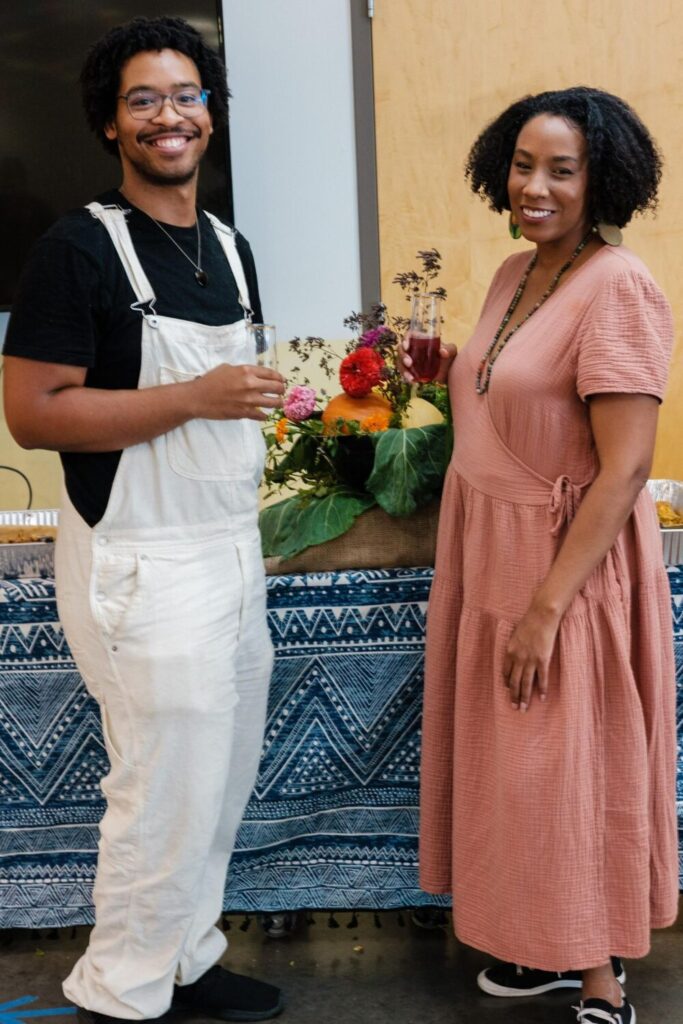
Food knowledge and food access are coming back to the forefront as people start to feel the pressure of economic and environmental changes, both Booker and Daniels-Johnson said. Daniels-Johnson highlighted how this is something that has both precedent in growing national consciousness in Black communities about food systems and a cultural history of gathering and connecting around food.
When she heard about Booker’s experiences at the last conference, Daniels-Johnson knew she had to find a way to see it for herself.
“I didn’t know that we had an opportunity to congregate, to all be together,” Daniels-Johnson told Madison365. “If you’re a grower in any sort of respect, whether it’s a gardener, farmer, an herbalist, or someone who’s involved in food systems any way at all, there’s just not a really good mechanism to bring BIPOC people together, but especially Black folks together, that isn’t sort of co-opted by another group or a nonprofit holding the keys. That, to me, was already something really exciting to think about.”
Daniels-Johnson made it clear that she is not just excited for herself though, as all three of the hopeful attendees looking to raise money all hope to bring valuable knowledge and insight back to the area for continuous development of their mission for local agriculture.
“I’m really interested in eco-justice from a standpoint of mutual aid,” said Daniels-Johnson. “How do we not just create something for one set of folks and have them be the benefactors of this, but how does that trickle down to the rest of our community in Madison and throughout Dane County? There’s an interesting conversation about some of this. I mentioned Alice’s Garden in Milwaukee, they’re doing the same thing. “
People knowing about the process and abundance of what can be grown in terms of food, as well as medicine and materials, plays the biggest part in creating something sustainable, according to Daniels-Johnson and Booker. Connecting communities of color in agriculture to gravitate towards collaboration and a network of support is the step that stood out as having the most potential to create both power and prosperity in the process of providing healthy food and lifestyles in the community.
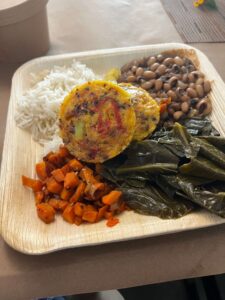 “Having this space where it’s very palatable for everyone, people of all ages of all backgrounds, because everyone has to eat,” said Booker. “Most people have an experience working with their grandparents, their aunt, or their parents, either in the kitchen or in the garden. There is some type of nostalgia that hits everybody so it’s a place to connect with anyone. Before I started farming, I would connect through small talk, and I hated small talk. Now I can literally just say, ‘What’s your favorite vegetable? What did you grow up eating?’ We can go all the way for hours talking about it.”
“Having this space where it’s very palatable for everyone, people of all ages of all backgrounds, because everyone has to eat,” said Booker. “Most people have an experience working with their grandparents, their aunt, or their parents, either in the kitchen or in the garden. There is some type of nostalgia that hits everybody so it’s a place to connect with anyone. Before I started farming, I would connect through small talk, and I hated small talk. Now I can literally just say, ‘What’s your favorite vegetable? What did you grow up eating?’ We can go all the way for hours talking about it.”
Booker pointed out the transitional period Madison currently finds itself in as more businesses and entrepreneurs of color are making their home in Madison and attempting to establish themselves in an area with growing resource availability. Looking ahead to the Black Urban Growers Conference, themes of unity and bringing restoration back for self and community were what drew Daniels-Johnson in the most.
“I think the part that I’ve been the most interested in as of late is that healing aspect,” Daniel-Johnson said. “How do I use this to heal myself? In the way of food and also herbalism, too, but also I’m thinking more trauma-based. In this sort of PTSD and things that come from our relationship to the land. I hear a lot of the stories and folks from Indigenous cultures. I love the connection that they have to the land, and I’m always looking for that same sort of ability to connect to nature in that way where it’s sustaining me in a way that’s more than myself.”
Booker echoed sentiments of feeling something special in spaces with fellow growers and food systems workers who did not hold back on topics such as growing marijuana or how food and produce can be used for pleasure or a variety of intimate healthcare needs as well.
Having gone to last year’s conference, Booker was also excited at the opportunity to share the joys with fellow local growers and hopes that this opportunity can continue forward to include others as it can be difficult to connect in communities of color around practices or occupations they are often not reflected widely in.
“That was really freeing to have those workshops where you’re not worried about someone watching so you can’t talk about this, or I need to look a certain way and present a certain way,” Booker explained. “That was really taken out. I’m excited to have that freedom to openly ask questions, and to openly get insight into something that I never would have asked. I learn and I’m able to share with other people, so that’s really what I’m looking forward to in the connections.”
Looking to make the first steps to build a community around Black people in agriculture, and people of color in agriculture in general, could not come soon enough. As ideas of how we can both support our communities from within while also continuing to make progress in areas of health and wellness combine, it will take coming together and having those conversations to put those thoughts into action.
“We are both committed to helping, not only send people to this particular conference, but maybe years after this,” said Daniels-Johnson with hopefulness in closing. “Maybe next year, we do it again, and we figure out how to bring more people into the fold. We’re really interested in folks, so if anyone winds up reading this, and would really love to know more about eco-justice or how to connect with each other and build that network and infrastructure here, I think that’s something that I’m also interested in. Letting folks know that those are the conversations that we’re looking to have. Not just in this event space, and not just through a conference, but we would love to hear more people’s voices as part of this collective and grow this movement.”
After the shared meal, attendees drew slips of paper on which were written discussion questions related to eldership, generational understanding, storytelling and food, prompting several emotional moments of sharing.
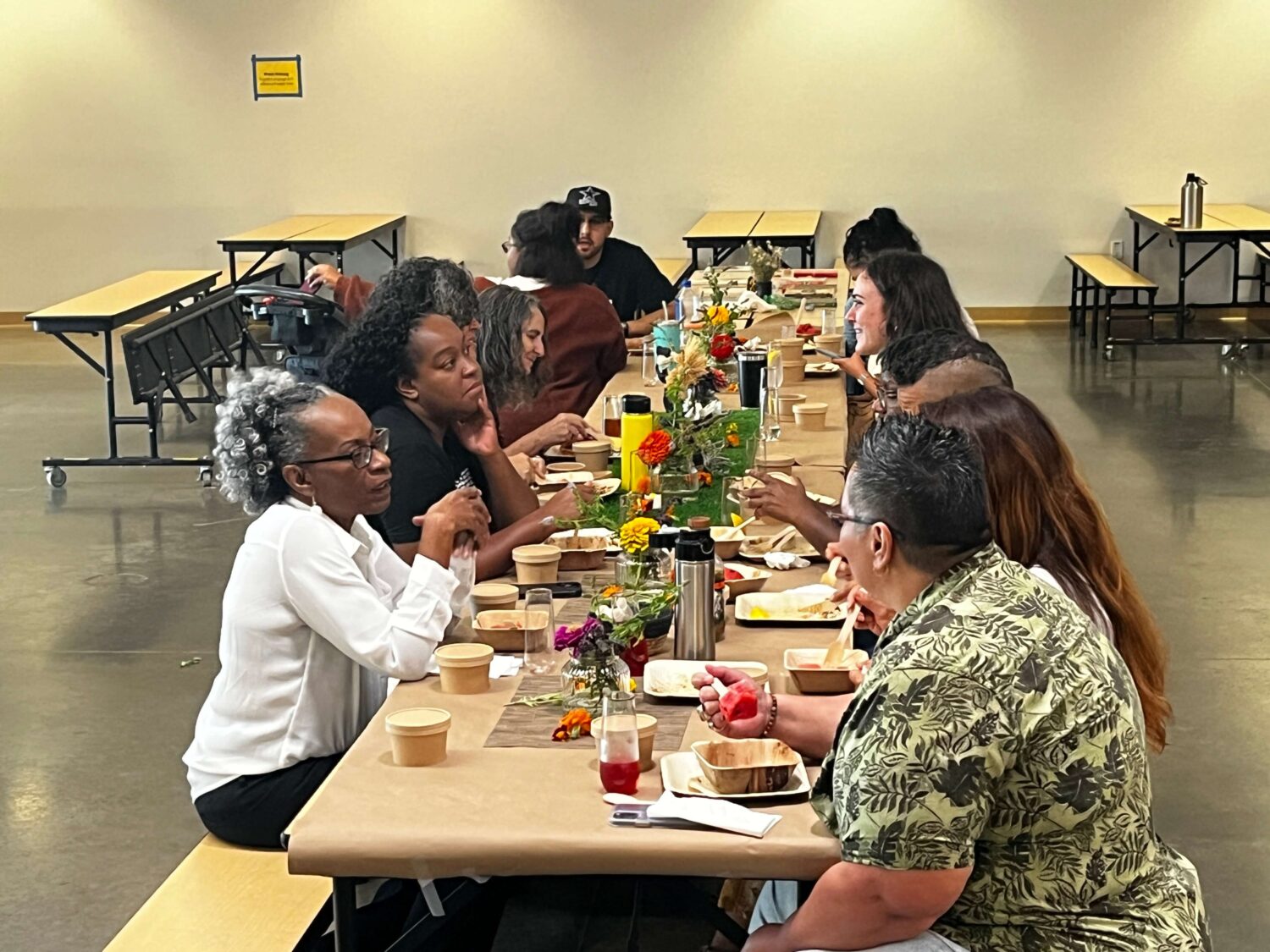
“The quality of the food matched the quality of the people here and what people are trying to do here. It’s beautiful,” said Tara Webb, who was attending with her friend Erika Rosales Garcia.
“Black and Indigenous folks are at the forefront of reconnecting with the land reconnecting with farming, reconnecting with true food reconnecting with things that are nourishing with that connection with Earth,” Rosales Garcia said. “I feel like doing this type of event is essentially us planting those seeds for our community and then to be able to do something and community and supportive community is very nourishing.”
To give direct support towards getting Charisse Daniels-Johnson, Alex Booker, and Sebastian Hassell out to Philadelphia for the Urban Black Growers Conference, donations can be made to Charisse-Daniel612 on Venmo, $reesdj on Cash App, or [email protected] on Paypal.
Also check out Alex Booker and Charisse Daniels-Johnson speak with Angela Russell on an episode of Black Oxygen earlier this month.



